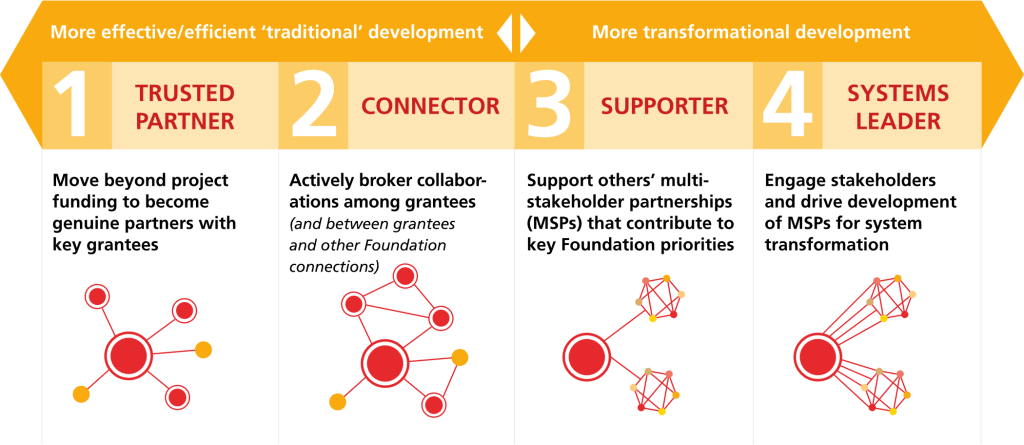The value that philanthropy can bring through partnership is significant. However, partnership is difficult. It needs investment of time and resources and an adjustment of mindset and expectations.
In this event, we partnered with The Partnering Initiative (TPI) to examine the initial findings of their Partnering for Philanthropic Impact Programme, in collaboration with the Z Zurich Foundation and Johnson & Johnson (J&J) Foundation.
Moderated by Alliance Features Editor Andrew Milner, the event’s speakers were:
- Anna Hirsch-Holland, Programme Director for Funder Impact, The Partnering Initiative
- David Nash, Climate Change and Partnerships Senior Manager, Z Zurich Foundation
- Neera Nundy, Co-founder and Partner, Dasra
- Mitali Wroczynski, Associate Director, Partnerships, Co-Impact
Here are some key takeaways from each panellist.

Anna Hirsch-Holland
- TPI was established because of a belief that ‘solving the world’s most complex challenges requires collaboration, but also that is very challenging and needs support.’ There’s now an ‘increasing appetite among foundations to enhance their impact through partnering approaches,’ and ‘to address historic and ongoing inequities.’
- They have developed a conceptual framework showing four models of the role foundations can play in partnering, which you can see in the below infographic.
- The trusted partner model is about ‘moving away from transactional, project-based short term funding relationships to longer-term partnership relationships with grantees.’
- The second model is about ‘bringing grantees together’ to ‘exploit synergies…around different but connected problems.’
- The third model is where a ‘foundation or other philanthropic organization provides funding or other support for a multi-stakeholder partnership.’
- The fourth model is around ‘systems leadership…putting the full weight of a foundation’s reputation and resources behind a certain cause’ in order to support ‘the whole infrastructure that’s required for an ambitious multi-stakeholder partnership.’
- Sticking points many organisations face include a lack of local knowledge, disconnect between board members and staff, and fixed mindsets that struggle to adjust to new partnering models which are exacerbated by short-term funding cycles.

To learn more about the initial findings of this programme, download the report here.
 David Nash
David Nash
- The Z Zurich Foundation were keen to move beyond transactional relationships with grantees and harnessed ‘the skills and expertise the corporate parent were able to provide’ (Zurich insurance group) to actively support partner organisations in a more collaborative approach.
- The Zurich foundation focuses on social equity, mental wellbeing, and climate change adaptation.
- In 2013 they worked with partners to create the ‘Zurich flood resilience alliance.’ This started off as the trusted partner model, however over time they found they got ‘much more synergy from the relationships’ by expanding the model to one which ‘encourages cross-fertilisation between all of the partners.’
- In order to evolve their partnership model, they’ve had to ‘look at what we’re trying to achieve collectively.’ The relationship is no longer dictated by Zurich Foundation, it’s about ‘collaboration, consensus, and discussion…about how we achieve things together.’
- ‘You can’t achieve this diversification of leadership…unless you can build that trust.’
- The benefits of this model are that it brings greater management capacity, more flexibility, and innovation.
 Neera Nundy
Neera Nundy
- Dasra is an intermediary that works with civil society and funders and has worked with around 1000 NGOs in India and funders all over the world. Its mission is to ‘drive collaborative action to accelerate social change.’ They run collaboratives working with adolescent girls, urban sanitation, social compact and building resilience in community-based organisations.
- They have found it important to set up the ‘concept of outcomes amongst organisations and funders’ to ‘build that common agenda.’
- Collaborative decision-making often still rests with funders – it’s important to design a governance process that focuses on equal system players to bring that level of neutrality to the governance.
- There’s also a need to develop more effective listening tools and feedback loops.
- GEDI – Gender, Equity, Diversity, Inclusion. Collaboratives are often funder-driven, but are we creating space for community influence and ensuring there is inclusive representation?
 Mitali Wroczynski
Mitali Wroczynski
- Co-impact ‘pools funding from donors across the world’ to ‘support local women-led organisations to drive impact at scale in the global South.’
- The pillars for a great partnership are ‘trust, shared values, shared purpose and goals, aligned incentives.’ It ultimately comes down to people who get along and want to work together and have the tenacity to drive the partnership forwards.
- Co-impact adopts a partnership approach that acknowledges ‘the power imbalance between donors and programme partners’ and gives locally-based programme partners decision-making power to act in the best interests of their communities.
- Philanthropy has the potential to lead the way in catalysing ‘a new way of delivering major systemic change’ as they’re not bound by the same restrictions as governments and multilateral funders.
- By pooling funding, donors have to relinquish a degree of control and accept that the outcomes of initiatives are prioritized above any individual organisation’s goals. Timing and readiness for partnership is one of the most important factors.
- Donor collaboratives are the future and can ‘transform the philanthropy space.’ Intermediaries such as Co-impact can take away some of the burdens on both sides, by using their expertise to facilitate collaboration.
Watch the full recording of the event here:
Our next Alliance event is titled ‘Levelling the global playing field: redefining the role of philanthropy in the North and South.’ It takes place on 10 May, 3pm BST. You can register to attend here.



Comments (1)
Thank you for putting together such an insightful blog post!
Download and install the latest version of tiktok 18+ online free.
Check and view latest and today set for life results online free.
Fabulous subject. I look forward to viewing and listening to the entire presentation. Especially if there are candid insights about where such “partnerships “ fall short because of participants not recognizing and adjust in g to the power imbalances among the participants James posner Posner-Wallace foundation New York city